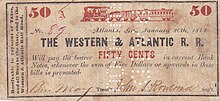This is an old revision of this page, as edited by Paul Dietrich (talk | contribs) at 02:04, 26 September 2013 (→Pre-civil war politics). The present address (URL) is a permanent link to this revision, which may differ significantly from the current revision.
Revision as of 02:04, 26 September 2013 by Paul Dietrich (talk | contribs) (→Pre-civil war politics)(diff) ← Previous revision | Latest revision (diff) | Newer revision → (diff)John Sharpe Rowland (August 6, 1795 - September 18, 1863) was a wealthy planter and politician in antebellum Georgia. During the American Civil War he served as a railroad executive.
Early life and military service
Rowland was born in Rutherfordton, North Carolina to Thomas and Mildred Lewis Rowland. His father served in the Revolutionary War. In 1810 his family moved to Greenville, South Carolina, and at age 17 John Sharpe Rowland "began teaching an English school with the permission of his parents." At age 19 he was appointed deputy collector of the revenue for the Pendleton District, South Carolina. He volunteered during the War of 1812 and served in Captain William Turner's Company under Lieutenant Colonel John Ashe Alston's 3rd Regiment, South Carolina Militia. There he served with rank as private, adjutant, and mustered out as a corporal.
Pre-civil war politics

In November 1816, he married Miss Frances Machen Lewis of Spartanburg, S.C. They had eleven children, four of whom died in infancy. In 1832, he was a member of the Committee of South Carolina during the Nullification Crisis, being a strong Union man. He purchased land in Cass County (now Bartow), Georgia in 1839 and built a sizable plantation of over 2,500 acres which was called "Etowah Valley". He served as postmaster for Etowah Valley from 1841 - 1845. In 1843, he purchased approximately 2,400 additional acres in Cass County (Bartow) about 9.5 miles northeast of his plantation and, built the most exclusive resort in the state of Georgia, Rowland Springs. Governor and Mrs. Joseph E. Brown were frequent guests there and four state governors vacationed there in one season. Renowned physician, scientist, conservationist, and educator, Joseph LeConte honeymooned at Rowland Springs in 1846. William Gilmore Simms, Southern poet, novelist, and historian, even mentions Rowland Springs in one of his works.
Among other notable friends of Major and Mrs. Rowland was Senator Stephen A. Douglas of Illinois who was hosted by them at Etowah Valley Plantation during his tour of the southern states in the spring of 1859.
From June 1–5, 1852, Major Rowland was a Georgia delegate to the Democratic National Convention in Baltimore, Md. He was a Unionist in a Georgia delegation that was evenly divided between Unionist and State's Rights delegates. After 49 ballots, Franklin Pierce of New Hampshire was nominated as the Democratic candidate for President with William King of Alabama as Vice-President.
Major Rowland was accorded the title of "Major" during his middle years for the many accomplishments and contributions that he made to his community and state of Georgia during his lifetime. At age 59 he stood 5' 10" tall, weighed approximately 210 pounds with dark hair and eyes and a swarthy complexion.
Civil War and death

In September 1861, Major Rowland was appointed Superintendent of the Western & Atlantic Railroad, which ran between Atlanta, Georgia and Chattanooga, Tennessee a distance of 138 miles. He held this position until his death on September 18, 1863. It was during his tenure as Superintendent that Andrews' Raiders stole a locomotive, The General, from Big Shanty, Georgia, and the Great Locomotive Chase ensued ending in their capture just two miles north of Ringgold, Georgia.
John Sharpe Rowland was said to be "a liberal supporter to widows and orphans of the Confederacy during the Civil War". "His body was lowered into the grave on the 20th of September 1863 when the cannons were booming at the Battle of Chickamauga, over 60 miles away. The roar could be heard at the time and he expected to sleep there until the Resurrection." (as told by his daughter-in-law, Serena Jane Dillard Rowland ). John Sharpe Rowland is buried at Rowland Cemetery in Cartersville, Bartow County, Georgia with his wife, two sons, daughter, and three grandchildren.
References
- ^ Livingston, John (1854). Portraits of Eminent Americans Now Living. Vol. 4. pp. 266–268.
- ^ Cunyus, Lucy Josephine (1933). History of Bartow County, Georgia formerly Cass. pp. 89–90.
- ^ Letter of Major John Sharpe Rowland to William T. Lewis dated October 8, 1855, letter held by the Alabama Archives, Montgomery, Alabama.
- Will of John Sharpe Rowland, Bartow County Probate Court, Will Book A, pp. 237-244.
- Charleston Courier, October 13, 1849, p.2.
- National Archives and Records, Record of Appt. of Postmasters 1832 - 1971, Roll #22, Archive Pub. #: M841.
- Charleston Courier, September 29, 1849, p. 2.
- Weekly Telegraph, Macon, Georgia, June 22, 1860, p. 3.
- The Autobiograpy of Joseph LeConte, D. Appleton and Company, New York 1903, electronic edition, pp. 121-122.
- Father Abbot, or, The Home Tourist: A Medley(1849)p.21
- Howell Cobb letter to Col. John B. Lamar, May 23, 1859, held by the University of Georgia, Howell Cobb collection of letters.
- Stephen A. Douglas, by Robert W. Johannsen, (1997) p. 704.
- The History of the Civil War in America, by John S.C. Abbott, (1866) vol. II, p. 448.
- New York Tribune, June 10, 1864, p.2.
- Proceedings of the Democratic National Convention Held at Baltimore, June 1–5, 1852.
- Southern Recorder, Milledgeville, Georgia, November 12, 1861, p. 2
- Southern Federal Union, Milledgeville, Georgia, October 15, 1861, p. 2.
- Obituary of Major John Sharpe Rowland, Atlanta Daily Intelligencer, September 30, 1863, p. 2.
- Lincoln's Spies, Thieves and Bridge-Burners, Augusta Chronicle, April 15, 1862, p. 1.
- Augusta Chronicle, April 15, 1863, p. 3.
- ^ Letters of Lydie Rowland Rudicil - 1944.